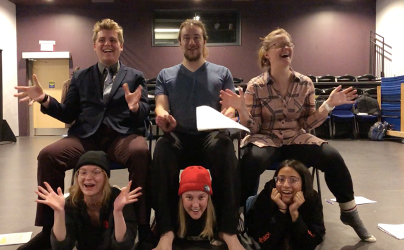Image caption:The Marilyn I. Walker School of Fine and Performing Arts in downtown St. Catharines.
An upcoming weekend of online events will explore the role that theatre education plays in relation to climate crisis.
To launch the new Routledge publication Theatre Pedagogy in the Era of Climate Crisis, the Marilyn I. Walker School of Fine and Performing Arts (MIWSFPA) is hosting a two-day online symposium featuring historians, theatre practitioners, playwrights, designers, professors and activists.
Presented as part of the 2020-21 Walker Cultural Leader’s Series program, the online symposium “Theatre Pedagogy in the Era of Climate Crisis” runs Saturday, March 20 and Sunday, March 21 and will be livestreamed free on the MIWSFPA YouTube channel.
Convened by volume co-editors David Fancy, Professor and Chair of the Department of Dramatic Arts at Brock University, and Conrad Alexandrowicz, Associate Professor of Theatre at the University of Victoria, the event features four online panel discussions with contributing authors of the volume, each a theatre scholar and/or practitioner.
Through these panel discussions, volume contributors will answer the question of how theatre pedagogy can be transformed in response to the global climate crisis. Panelists are purposely divided into groups that mix their different expertise, encouraging a rich and invigorating discussion.
“Nothing could be more pressing than understanding how to evolve our theatre training and pedagogy to address the climate crisis,” says Fancy.
The volume’s authors, he adds, also “unpack how supremacy thinking informing the climate crisis — that humans are more important than nature — is echoed across racial and gendered violence in contemporary societies.”
Each panel is based on a theme in the anthology: Intersectionality and the Body of the Earth; Eco-Aesthetics in Performance and Design; Eco-literacies in Teaching Theatre; and Theatre Pedagogy and the Climate Crisis.
A summary of the volume can be found in a manifesto signed by all contributing authors in the epilogue of the book.
Upcoming Walker Cultural Leaders events:
Saturday, March 20
1 to 2:15 p.m. — Theatre Pedagogy and the Climate Crisis
Moderated by David Fancy with Lara Aysal, Derek Davidson, Katrina Dunn and Beth Osnes.
Watch the livestream.
3 to 4:15 p.m. – Eco-Aesthetics in Performance and in Design
Moderated Conrad Alexandrowicz with Tanja Beer, Rachel Bowditch, Joan Lipkin and David Vivian.
Watch the livestream.
Sunday, March 21
1 to 2:15 p.m. – Eco-Literacies in Teaching Theatre
Moderated by Sasha Kovacs with Mary Anderson, Dennis Gupa and David Fancy.
Watch the livestream.
3 to 4:15 p.m. – Intersectionality, Solidarity and the Body of the Earth
Moderated by Rachel Rhoades with Gloria Akayi Asoloko, Soji Cole and Conrad Alexandrowicz.
Watch the livestream.
More event information, including full biographies of each panelist, can be found online at brocku.ca/tpcc


